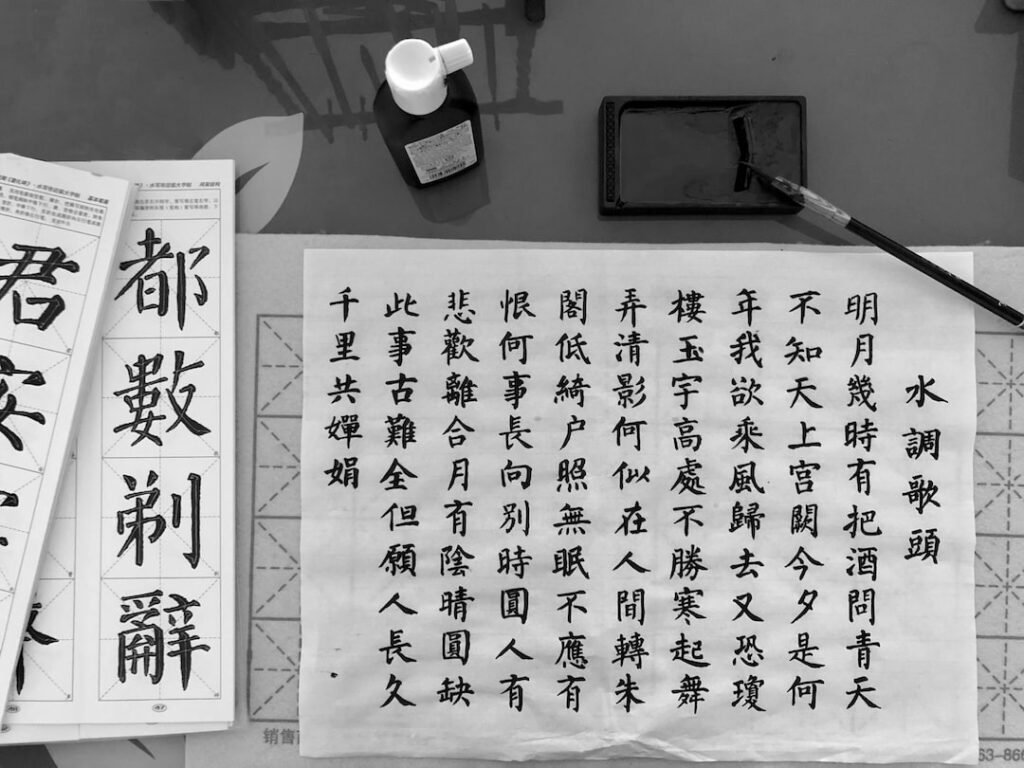Having a wide range of vocabulary is crucial for language learning, and this holds true for learning Chinese as well. Vocabulary forms the foundation of any language, allowing individuals to express themselves effectively and understand others. In the case of Chinese, a language with a rich history and complex characters, expanding one’s vocabulary becomes even more important.
There are numerous benefits to having a wide range of vocabulary in the Chinese language. Firstly, it allows individuals to communicate more fluently and confidently. With a larger vocabulary, learners can express their thoughts and ideas more precisely, avoiding misunderstandings and confusion. Additionally, a broader vocabulary enables learners to understand a wider range of texts, whether it be literature, news articles, or academic papers. This not only enhances their language skills but also expands their knowledge in various fields.
Furthermore, having an extensive vocabulary in Chinese opens up opportunities for cultural immersion. Language is deeply intertwined with culture, and by understanding the nuances of Chinese words and phrases, learners can gain a deeper appreciation for Chinese customs, traditions, and way of life. This can lead to more meaningful interactions with native speakers and a greater understanding of the Chinese society as a whole.
Table of Contents
ToggleKey Takeaways
- Expanding your vocabulary is important for effective communication and understanding.
- Knowing common Chinese words for everyday conversation can help in social situations.
- Essential vocabulary for traveling in China includes transportation, accommodations, and basic phrases.
- Business vocabulary for Chinese professionals includes terms for negotiations, meetings, and presentations.
- Vocabulary for Chinese language learners includes grammar, sentence structure, and pronunciation.
Common Chinese Words to Know for Everyday Conversation
In order to have basic conversations in Chinese, it is essential to know some common words and phrases. Greetings and basic phrases such as “hello” (你好 nǐ hǎo), “thank you” (谢谢 xiè xiè), and “sorry” (对不起 duì bù qǐ) are a good starting point. These simple phrases can help establish rapport and show respect when interacting with native speakers.
Numbers and counting are also important for everyday conversation. Knowing how to count from one to ten (一 yī, 二 èr, 三 sān, 四 sì, 五 wǔ, 六 liù, 七 qī, 八 bā, 九 jiǔ, 十 shí) is essential for basic communication, whether it be ordering food, asking for directions, or discussing prices.
Time and dates are another crucial aspect of everyday conversation. Being able to ask and understand questions such as “What time is it?” (现在几点了?xiàn zài jǐ diǎn le?) and “When is your birthday?” (你的生日是什么时候?nǐ de shēng rì shì shén me shí hòu?) can help individuals navigate daily life and make plans.
Directions and locations are also important for getting around in Chinese-speaking countries. Knowing words such as “left” (左边 zuǒ biān), “right” (右边 yòu biān), “straight” (直走 zhí zǒu), and “turn” (转 zhuǎn) can be incredibly useful when asking for directions or navigating public transportation.
Essential Vocabulary for Traveling in China
For individuals planning to travel to China, it is important to have a basic understanding of essential vocabulary related to transportation, accommodation, ordering food and drinks, shopping, and emergency situations.
Transportation and accommodation vocabulary includes words such as “airport” (机场 jī chǎng), “train station” (火车站 huǒ chē zhàn), “hotel” (酒店 jiǔ diàn), and “room” (房间 fáng jiān). Knowing these words can help travelers navigate their way through airports and train stations, as well as book accommodations.
Ordering food and drinks vocabulary is essential for trying out local cuisine. Words such as “menu” (菜单 cài dān), “rice” (米饭 mǐ fàn), “noodles” (面条 miàn tiáo), and “water” (水 shuǐ) can help individuals communicate their preferences and dietary restrictions when dining out.
Shopping and bargaining vocabulary is useful for those who enjoy shopping or want to buy souvenirs. Words such as “price” (价格 jià gé), “discount” (折扣 zhé kòu), and “size” (尺码 chǐ mǎ) can help individuals negotiate prices and find the right items.
Emergency situations vocabulary is important for unexpected circumstances. Words such as “help” (救命 jiù mìng), “hospital” (医院 yī yuàn), and “police” (警察 jǐng chá) can be crucial in times of need.
Business Vocabulary for Chinese Professionals
For professionals working in a Chinese-speaking environment, having a strong business vocabulary is essential. This includes knowing common business terms and phrases, negotiation and communication skills, marketing and advertising vocabulary, and financial and accounting terms.
Common business terms and phrases include words such as “meeting” (会议 huì yì), “presentation” (演讲 yǎn jiǎng), and “deadline” (截止日期 jié zhǐ rì qī). Knowing these words can help professionals navigate the corporate world and communicate effectively with colleagues and clients.
Negotiation and communication skills are crucial in business settings. Words such as “negotiate” (谈判 tán pàn), “agreement” (协议 xié yì), and “compromise” (妥协 tuǒ xié) can help professionals navigate negotiations and reach mutually beneficial outcomes.
Marketing and advertising vocabulary is important for professionals in the marketing and advertising industry. Words such as “brand” (品牌 pǐn pái), “target audience” (目标受众 mù biāo shòu zhòng), and “campaign” (广告活动 guǎng gào huó dòng) can help professionals create effective marketing strategies and communicate their ideas to clients.
Financial and accounting terms are crucial for professionals in finance and accounting roles. Words such as “revenue” (收入 shōu rù), “expenses” (费用 fèi yòng), and “profit” (利润 lì rùn) can help professionals analyze financial data and make informed decisions.
Vocabulary for Chinese Language Learners
For individuals learning Chinese as a second language, there are specific vocabulary areas that are important to focus on. This includes basic grammar and sentence structures, vocabulary for language proficiency tests, Chinese characters and their meanings, and common mistakes made by language learners.
Basic grammar and sentence structures include words such as “subject” (主语 zhǔ yǔ), “verb” (动词 dòng cí), and “object” (宾语 bīn yǔ). Understanding these words can help learners grasp the fundamental building blocks of Chinese sentences.
Vocabulary for language proficiency tests is important for individuals preparing for exams such as the HSK (Hanyu Shuiping Kaoshi). Words such as “listening” (听力 tīng lì), “reading” (阅读 yuè dú), and “writing” (写作 xiě zuò) can help learners focus their studies and prepare effectively for the test.
Chinese characters and their meanings are crucial for learners who want to read and write in Chinese. Words such as “character” (字 zì), “stroke” (笔画 bǐ huà), and “radical” (部首 bù shǒu) can help learners understand the structure and meaning behind Chinese characters.
Common mistakes made by language learners include words such as “pronunciation” (发音 fā yīn), “grammar” (语法 yǔ fǎ), and “vocabulary” (词汇 cí huì). Understanding these words can help learners identify and correct their mistakes, improving their overall language proficiency.
Words for Describing Food and Drink in Chinese Cuisine

Chinese cuisine is renowned for its diverse flavors and unique ingredients. Knowing words to describe food and drink can enhance the dining experience and allow individuals to appreciate the nuances of Chinese cuisine.
Popular Chinese dishes and their ingredients include words such as “dumplings” (饺子 jiǎo zi), “fried rice” (炒饭 chǎo fàn), and “hot pot” (火锅 huǒ guō). Understanding these words can help individuals navigate menus and order their favorite dishes.
Describing flavors and textures is important for understanding the different tastes and mouthfeel of Chinese dishes. Words such as “spicy” (辣 là), “sweet” (甜 tián), “sour” (酸 suān), and “crispy” (脆 cuì) can help individuals communicate their preferences and understand the characteristics of different dishes.
Ordering food in a restaurant vocabulary includes words such as “waiter/waitress” (服务员 fú wù yuán), “menu” (菜单 cài dān), and “bill” (账单 zhàng dān). Knowing these words can help individuals navigate the dining experience and communicate their preferences to the waitstaff.
Chinese tea culture and vocabulary is also important for those who want to explore the world of Chinese tea. Words such as “green tea” (绿茶 lǜ chá), “black tea” (红茶 hóng chá), and “oolong tea” (乌龙茶 wū lóng chá) can help individuals understand the different types of tea and their brewing methods.
Chinese Words for Cultural Concepts and Traditions
China has a rich cultural heritage, and understanding the vocabulary related to festivals, customs, traditions, art, literature, philosophy, and religion can provide a deeper insight into Chinese culture.
Festivals and celebrations vocabulary includes words such as “Chinese New Year” (春节 chūn jié), “Mid-Autumn Festival” (中秋节 zhōng qiū jié), and “Dragon Boat Festival” (端午节 duān wǔ jié). Knowing these words can help individuals understand the significance of these festivals and participate in cultural celebrations.
Chinese customs and traditions vocabulary includes words such as “red envelope” (红包 hóng bāo), “tea ceremony” (茶道 chá dào), and “kung fu” (功夫 gōng fū). Understanding these words can help individuals appreciate the customs and traditions that are deeply ingrained in Chinese society.
Chinese art and literature vocabulary includes words such as “calligraphy” (书法 shū fǎ), “painting” (画 huà), and “poetry” (诗 shī). Knowing these words can help individuals appreciate the beauty and intricacy of Chinese art forms.
Chinese philosophy and religion vocabulary includes words such as “Confucianism” (儒家 rú jiā), “Taoism” (道家 dào jiā), and “Buddhism” (佛教 fó jiào). Understanding these words can provide insights into the philosophical and spiritual beliefs that have shaped Chinese culture.
Vocabulary for Discussing Chinese History and Politics
China has a long and complex history, and understanding the vocabulary related to historical events, political systems, foreign policy, and media can help individuals engage in discussions about Chinese history and politics.
Key historical events and figures vocabulary includes words such as “Great Wall” (长城 cháng chéng), “Mao Zedong” (毛泽东 máo zé dōng), and “Cultural Revolution” (文化大革命 wén huà dà gé mìng). Knowing these words can help individuals understand the major events and figures that have shaped China’s history.
Political systems and structures vocabulary includes words such as “Communism” (共产主义 gòng chǎn zhǔ yì), “National People’s Congress” (全国人民代表大会 quán guó rén mín dài biǎo dà huì), and “Party Secretary” (党委书记 dǎng wěi shū jì). Understanding these words can help individuals navigate discussions about China’s political system.
Chinese foreign policy vocabulary includes words such as “diplomacy” (外交 wài jiāo), “international relations” (国际关系 guó jì guān xì), and “One Belt One Road” (一带一路 yī dài yī lù). Knowing these words can help individuals understand China’s approach to global affairs.
Chinese media and propaganda terms include words such as “censorship” (审查 shěn chá), “propaganda” (宣传 xuān chuán), and “state-controlled media” (国有媒体 guó yǒu méi tǐ). Understanding these words can help individuals analyze and discuss the role of media in China.
Chinese Words for Technology and Innovation
China is known for its advancements in technology and innovation. Understanding the vocabulary related to internet and social media, science and technology, e-commerce, and artificial intelligence can help individuals stay up to date with the latest trends.
Internet and social media vocabulary includes words such as “website” (网站 wǎng zhàn), “social media” (社交媒体 shè jiāo méi tǐ), and “online shopping” (网购 wǎng gòu). Knowing these words can help individuals navigate the digital landscape in China.
Science and technology terms include words such as “robot” (机器人 jī qì rén), “artificial intelligence” (人工智能 rén gōng zhì néng), and “nanotechnology” (纳米技术 nà mǐ jì shù). Understanding these words can help individuals stay informed about the latest technological advancements.
E-commerce and online shopping vocabulary includes words such as “payment” (支付 zhī fù), “shopping cart” (购物车 gòu wù chē), and “delivery “delivery” (配送 pèi sòng). These terms are essential for understanding the process of buying and selling goods online. “Payment” refers to the act of transferring money from the buyer to the seller in exchange for a product or service. “Shopping cart” is a virtual container that allows users to add items they wish to purchase while browsing an online store. Finally, “delivery” refers to the transportation of purchased items from the seller to the buyer’s designated location. Understanding these terms is crucial for navigating the world of e-commerce and online shopping effectively.








